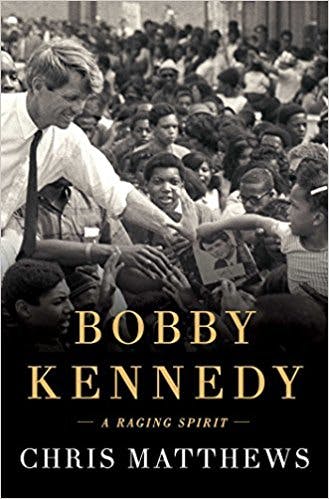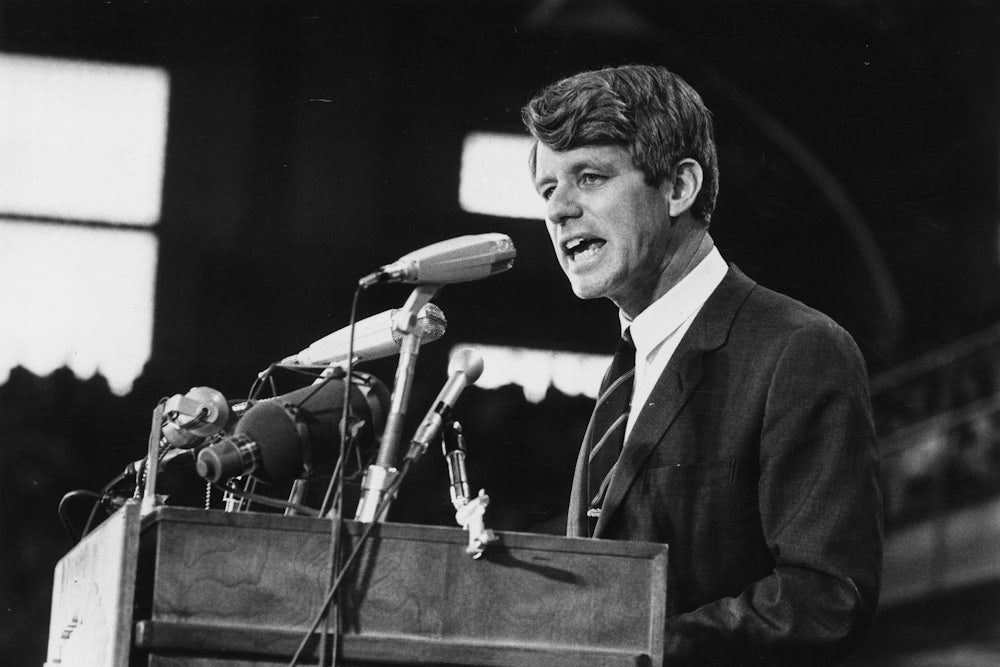Fifty years ago this March, Robert F. Kennedy commenced a campaign for president that political junkies and romantics still obsess over. In just 82 days between March 16, 1968 and June 5, 1968, the country witnessed a stunning series of events. The younger brother of slain president John F. Kennedy challenged his successor, Lyndon B. Johnson, for the Democratic presidential nomination. Days later, LBJ withdrew from the contest. In early April came the brutal assassination of Martin Luther King Jr., followed by urban rioting in 125 American cities. Ultimately, in June, a second Kennedy brother would be assassinated.

In between, Kennedy raised the possibility of an inclusive populist political coalition of working class whites and working class blacks, the likes of which have not been fully replicated since. These groups came together, at a time when they were at each other’s throats, to support an idealistic yet tough candidate. After Robert Kennedy was assassinated, his voters lined the railroad tracks of the train that bore his body from New York to Washington, D.C.
Those train tracks are the image with which Chris Matthews, the loquacious host of MSNBC’s Hardball, begins and ends his book, Bobby Kennedy: A Raging Spirit. Matthews describes the people: “young, old, black, white, men and women, few well-off, all caught up in their shared devastation.” These warring groups were, he writes, “massed along the tracks on that hot early summer day, holding American flags and saluting, waiting to see him pass.”
The 1968 campaign was the culmination of a remarkable 42-year life that Matthews chronicles with considerable insight from beginning to end. The challenge for the author is that the basic contours of Robert Kennedy’s story are well known: his comfortable upbringing as the seventh child of Joseph and Rose Kennedy; his role in helping his older brother Jack get elected to Congress, then the Senate, then the presidency; his leadership as Attorney General fighting for civil rights and advising his brother in the Cuban Missile Crisis; RFK’s election as a U.S. Senator from New York in 1964; and the final campaign for the presidency four years later. Matthews’s special contribution is to focus in on two powerful influences on RFK—his father and the Catholic Church—both of which arguably contributed to Kennedy’s unique blend of compassion and toughness.
The family patriarch, Joseph P. Kennedy, is the clear villain in the book. A notorious anti-Semite who, as the U.S. Ambassador in London, sought to appease Adolph Hitler, the imperious father is shown to be constantly meddling in his children’s lives—from distracting them during puts on the golf course to attempting to dictate when they should run for public office. Joseph Kennedy is a particularly cold father to his small son Bobby, the altar boy. “In the eyes of his demanding dad, he simply lacked the qualities the father believed to be of any value,” Matthews writes. “From childhood on, Bobby showed a large heart and generous spirit, both traits believed by Joe Kennedy to count for nothing.”
Young Bobby Kennedy craved his father’s approval, once racing “so hard to get to dinner on time, in desperate fear of the senior Kennedy’s wrath, that he smashed his head into a glass wall he thought might prove a shortcut.” At just five-foot-ten and 165 pounds, RFK tried out for and made Harvard’s football team, something neither of his brothers had done. “The boy his father had called a ‘runt’ was showing him who he had become,” Matthews writes.
Years later, RFK, by then a U.S. Senator, asked the child psychiatrist Robert Coles to lunch to talk about the effects of child poverty. Matthews says, “Coles found that his host’s questions about child development—about fathers and sons, about kids who don’t easily fit in, about trying always to prove oneself—seemed, really, to be about himself.” Coles told Matthews that given his upbringing, RFK “knew vulnerability alongside privilege and power.”
Bobby Kennedy’s second major influence—during his childhood and in later years—was the Roman Catholic Church. Bobby was the most devout of the Kennedy sons, which earned him the special approval of his mother. He attended St. Paul’s boarding school for just two months, before leaving in part because both he and his mother didn’t like the school’s exclusive reliance on the Protestant King James Bible. Years later, Jackie Kennedy would quip, “I think it’s so unfair of people to be against Jack because he’s a Catholic. He’s such a poor Catholic. Now, if it were Bobby, I could understand it.” When dating, Bobby was attracted to another devout Catholic, Ethel Skakel, who was considering becoming a nun. “How can I fight God?” he asked a friend.
Part of being Catholic in those days was being an outsider. Although raised amidst great wealth, Bobby was taught about the mistreatment of Irish immigrants who had faced employment signs reading “No Irish Need Apply.” At Harvard, he resigned from the Spee Club when it blackballed a fellow Irish Catholic. When Kennedy did a stint with the U.S. Navy as a seaman, he wrote a friend that his shipmates had “a lot of something that a lot of those guys at Harvard lacked.” He saw the New York Times as an “anti-Catholic” newspaper.
Kennedy’s Catholicism also fueled intense anti-Communism. Senator Joe McCarthy (for whom Kennedy would work as lawyer) drew an “all-out battle between communistic atheism and Christianity.” Catholics were particularly irate about the way in which Eastern Europe had been lost to Communists. In a personal note, Matthews says, “I grew up hearing that call to American Catholics to rally against Communism,” and recalls his Irish Catholic mother intensely watching the Army–McCarthy hearings in the 1950s. “She wasn’t rooting for the army,” he quips.
These two influences—the domineering father and the Catholic Church—helped shape Kennedy’s tough liberalism. On the one hand, the father’s values seemed to have instilled in the son an impatience with softness and elitism. As manager of his brother’s political campaigns, and as a foe of corrupt union leaders like Jimmy Hoffa, RFK developed a reputation for “ruthlessness.” When he worked on Adlai Stevenson’s 1956 presidential campaign, Bobby Kennedy perceived that Stevenson couldn’t seem to make hard decisions and noticed that he “talked over people’s heads” at campaign stops. Kennedy developed a “contempt for liberals,” Matthews writes, and actually ended up voting for Eisenhower.
At the same time, RFK’s deep identification as a Catholic outsider in Protestant America—and as a sometimes mistreated son—also helped him develop a strong sense of compassion, especially as the civil rights movement began to build. During his brother’s 1960 presidential campaign, RFK called a Georgia judge to help gain Martin Luther King Jr.’s release from jail. As Attorney General, Kennedy raised money from union leaders to bail civil rights activists out of a Birmingham jail. He connected black struggle with the struggle of Irish-Americans, suggesting that if America could elect an Irish Catholic president, it would elect a black president within 40 years.
It is sometimes said that there were two Bobby Kennedys divided by time: the ruthless Bobby prior to John F. Kennedy’s assassination in 1963, and the newly compassionate Bobby who suffered the tremendous pain of losing “the brother he had idolized, to whom he had given so much and with whom he had worked so hard.” Bobby began reading poetry and became a more vocal tribune of the underprivileged in the years after Dallas. He expressed outrage at hunger in the Mississippi Delta, mistreatment of Native Americans on reservations, and unfair conditions faced by migrant workers in California. In February 1966, the hardline anti-Communist came out against the Vietnam War.
As he “became convinced that poverty was his brother’s last unfinished agenda,” Matthews tells, this “new” Bobby drew upon an old reservoir of Catholic teachings, illuminated by Dorothy Day and Michael Harrington. This is a departure from the commonly taken view that “the younger brother’s true soul showed itself only after Jack.” Matthews sees instead “early evidence” of that “compassion which was later to reveal itself so vividly.” Conversely, the toughness was also there in the later years—as, for example, when RFK continually reminded voters during the rioting of 1968 that he had been “the chief law enforcement officer of the United States.”
Fifty years after Robert Kennedy’s death, African Americans remain staunch Democrats, while working class whites have come to support, in the most recent election, a reactionary and racist populist. In 1968, polls found that Robert Kennedy drew support from many former George Wallace voters; in 2016, the reverse transpired, as enough former Barack Obama voters swung the election by supporting Donald Trump. “It’s now the accepted wisdom,” Matthews notes “that the interests of the discarded factory worker and the ignored inner-city youth cannot be met together, so why try?”
The biography details how RFK built this coalition not by choice, but necessity. By the time he joined the presidential race, anti-war candidate Eugene McCarthy had already locked up many of the upper-middle class white liberals and students who might have supported Kennedy. This left RFK in a tricky position: “He was looking to maximize his popularity among minorities, exciting them enough to turn out at the polls in large numbers. Yet it would be a balancing act. He’d need to accomplish that feat while at the same time not scaring off the white working class voters.”
Matthews does not discuss it, but there is some scholarly debate over exactly how successful RFK was in getting the white working class vote. The first-hand observers who wrote about the campaign—Jack Newfield, David Halberstam, Jules Witcover, Roland Evans and Robert Novak—were all impressed by the coalition, but respected historian Ronald Steel has questioned Kennedy’s appeal. My reading of the evidence from precinct returns and polls—which I will outline in a forthcoming Century Foundation report—suggests the biracial appeal was strong.
Kennedy’s unusual coalition may have been related to his willingness to fight for the underdog, but also to avoid political correctness. He was a champion of civil rights but also an opponent of racial preferences. He was deeply concerned about the racial and economic injustices that sparked riots, but also was a sharp critic of lawlessness. “Though a man of growing compassion,” Matthews writes, “he believed in law and order and didn’t hesitate to employ the phrase.” Liberals appreciated his opposition to the Vietnam War, but hard hats knew that he didn’t want to let wealthy college students off the hook with draft deferments. What made Robert Kennedy unique, wrote Jack Newfield, in words Matthews quotes, “was that he felt the same empathy for white workingmen and women that he felt for blacks, Latinos and Native Americans.”
Of course, Kennedy also benefitted from what Matthews called a “special power he and he alone possessed. He could excite people with the undeniably romantic notion of another Kennedy era, a New-er Frontier.” When crowds came out for his Senate campaign, Kennedy told a colleague, “Don’t you know? They’re for him”—meaning John Kennedy.
That said, Robert Kennedy managed to forge a multi-racial class-based coalition at a time when white people were considerably more racist than they are today. In response to the current conditions of economic stress, we have seen the rise of a fake populist who preys on division. But what if a candidate instead sought to unite working class people across racial lines around an inclusive populism that blends compassion for the underdog with a tough-mindedness about the way the world works? Matthews raises the powerful reminder that Robert Kennedy did just that—and so could we.
